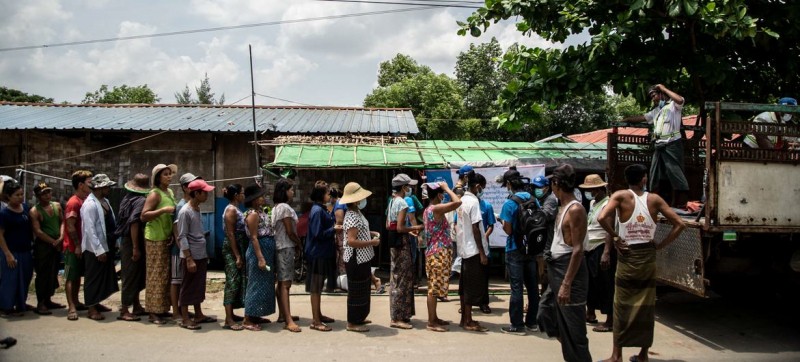Contents
Rice distribution in urban Yangon, Myanmar. Marking the first anniversary of the military coup in Myanmar, the independent UN expert monitoring the country implored States on Tuesday to take more robust action, reiterating his call for an arms embargo to stop the killing of innocent people. “Now is not the time for more rhetoric, it is time for meaningful action”, said Tom Andrews, Special Rapporteur on the situation of human rights in Myanmar. “The international community must take strong, meaningful steps to cut the junta’s access to weapons, funds and legitimacy”. The UN expert reiterated the urgent need for the Security Council to impose an arms embargo on the Myanmar military and significantly increase financial pressure on the junta. “The fact that one year has elapsed with no Security Council Resolution imposing a comprehensive arms embargo – as arms continue to flow to the junta and kill innocent people – is unacceptable”, he stated. “The people of Myanmar deserve better from the United Nations”. People ‘deserve better’
‘Criminal enterprise’
The Special Rapporteur said that he would soon release a report identifying the weapons in the junta’s arsenal and where they came from.
Mr. Andrews pointed out that the military junta is functioning as “a criminal enterprise”, committing murder, torture, abductions and forced displacement – while stealing revenue and seizing assets of the people of Myanmar.
“What is worse, they appear to be getting away with it. Their attacks continue unabated. The suffering of the Myanmar people is steadily increasing”, he continued.
Recent months have seen an even further escalation of violence, and a campaign of terror now widespread across the country.
“I have received more reports of mass killings, attacks on hospitals and humanitarian targets, and the bombing and burning of villages”, he added.
Unwavering commitment
“I am amazed at the resilience of the Myanmar people. In the face of aerial assaults, and mass arrest and torture, they continue to strike, to protest, to speak out and to defend themselves. They need and deserve stronger support from the international community”, he said. “The best and worst of humanity is unfolding in Myanmar”.
Special Rapporteurs are appointed by the Geneva-based UN Human Rights Council to examine and report back on a country situation. The positions are honorary and they are not paid for their work.
New UN humanitarian response plan
Meanwhile, Jens Laerke, Deputy Spokesperson for the UN humanitarian office, OCHA, noted that the newly published 2022 Humanitarian Response Plan (HRP) for Myanmar requests a record $826 million to assist 6.2 million people in need.
The 2022 plan represents double the amount requested last year, reflecting a growing crisis that has plunged an estimated 14.4 million people into humanitarian need.
Since the military coup, conflict and insecurity has continued, displacing more than 400,000 people to camps, displacement sites and with host communities. Many others have crossed into Thailand and India or sought refuge in the jungle, lacking adequate food, shelter, sanitation and medical care.
Sick and hungry
The economic and political turmoil of 2021, combined with the devastating impact of COVID-19, have driven half the population into poverty, with many unable to feed their families.
Over 13 million people are moderately or severely food insecure and malnutrition is expected to worsen among children, unless parental support is increased.
“Our ability to save lives and reduce suffering on this scale will depend on increased funding, improved access and removal of bottlenecks such as visa delays and banking restrictions”, said Mr. Laerke.
“Humanitarian agencies must be allowed access to displacement sites to conduct needs assessments and deliver lifesaving aid including food, water and health care”, he added.



